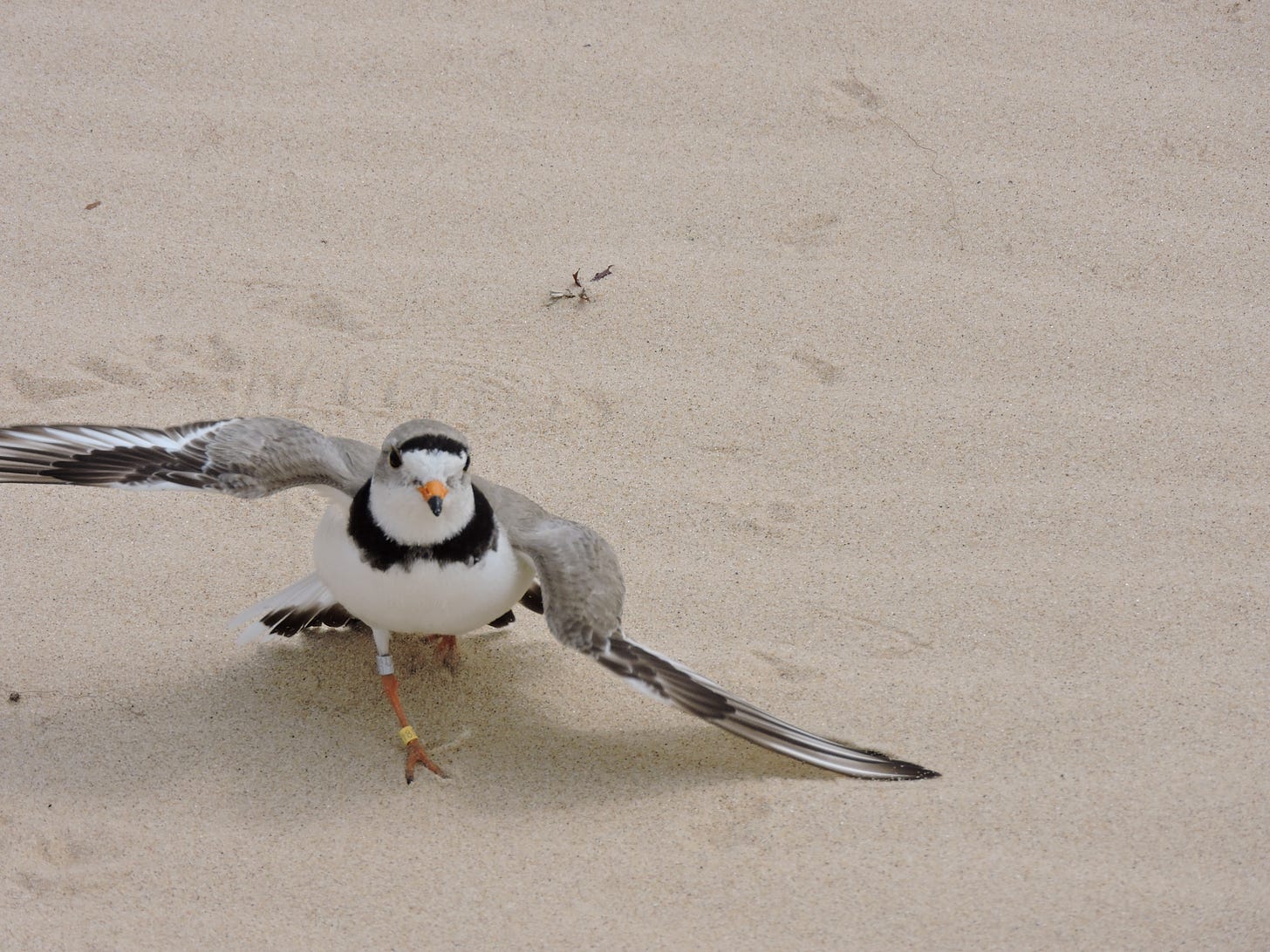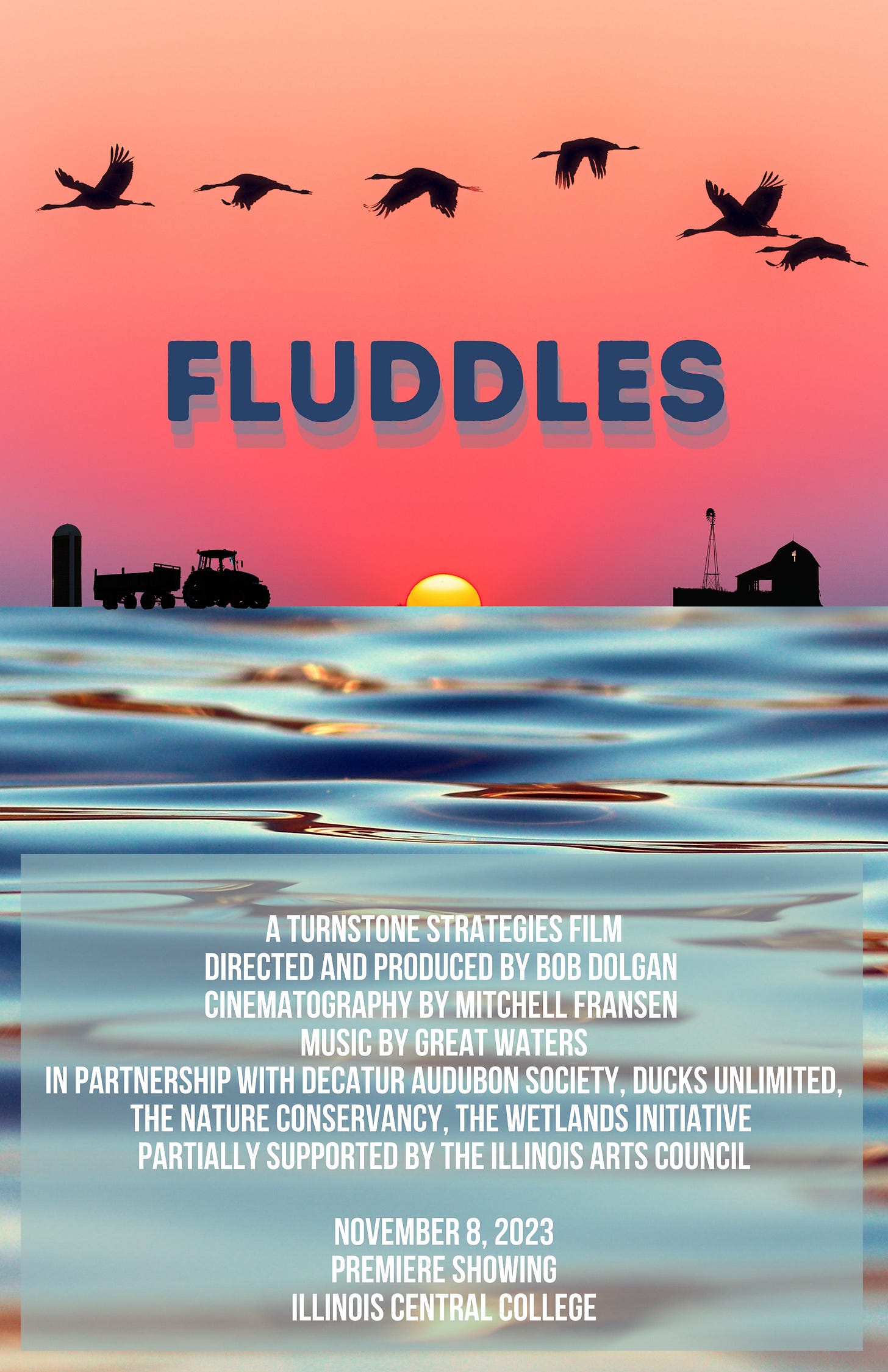Plovers with local ties seen in Florida, Georgia
Plus, FLUDDLES documentary debut, night-herons, and another flamingo sighting.
Regular readers of this space might recall that four captive-reared Piping Plovers, a federally endangered species, were released at Illinois Beach State Park in July. Illinois became the first state other than Michigan to host captive-reared chicks—fledglings who through one circumstance or another could not have survived in the wild.
One of the four chicks, dubbed Pepper for common pepper cress, has now been seen and photographed on wintering grounds near Fort Myers, Florida.
Cheri Hollis, a volunteer with the Sanibel Captiva Conservation Foundation, discovered Pepper — a 1.5-ounce bird still wearing its immature plumage — on Aug. 31, cavorting on the Florida beach with two other young piping plovers.
“It is the best feeling ever when you find a bird like Pepper,” said former Homer Glen resident Hollis, who took photos with the bird’s unique banding to send to biologists.
Pepper’s story starts on the Lake Ontario shores of upstate New York. Pepper—then an egg—lost one of its parents to Merlin predation, which meant that the eggs likely wouldn’t make it through incubation. The clutch was taken to a facility in Pellston, Michigan, where they were hatched and raised. They were then driven to Illinois Beach, near Waukegan, for release under the watchful eyes of volunteers from the Sharing Our Shores Waukegan program.
Sheryl DeVore of the Lake County News-Sun has more on the story:
Pepper was last seen by volunteer monitors on Aug. 4 along a secluded beach in Lake County. “We have been waiting anxiously for any word of our birds making the long and dangerous journey to their wintering grounds,” [volunteer Susan] Lamberts said.
They got the good news in early September.
Hollis was looking for Red Dot, another piping plover wintering at a Florida beach near Fort Myers on Aug. 31 when she noticed a new young plover hanging around with Red Dot. She took photos and reported the find to the Great Lakes Piping Plover Conservation Team.
“They came back with the amazing story of how Pepper came to be,” Hollis said. “The monitors in Illinois were so excited.”
YOGi seen in Georgia
Some might recall the story of YOGi, dad to Chicago’s famed Monty, who has nested for six years at Michigan’s Silver Lake State Park. The Great Lakes Piping Plover Conservation Team reports that YOGi has been seen on the winter shores of Cumberland Island, Georgia, recently. It’s a heartening development after a tough summer at Silver Lake, a site with massive sand dunes almost directly across Lake Michigan from Chicago. One of the quirks there is that an off-road vehicle area, or ORV, sits smack dab in the middle of Piping Plover habitat.
Here’s an excerpt from an Instagram post via the conservation team:
[YOGi] was fairly late to nest, but eventually found a female and then he safely moved two of his chicks across the treacherous ORV zone to a fruitful foraging spot. One sneaky chick started to fly and almost fledged, then a Merlin came around and snatched it up at 24 days old.
YOGi has been a prolific nester and plover dad whose family tree spans far and wide across the Great Lakes, including being grandpa to Chicago’s indomitable Imani.
Documentary about fluddles set for its debut
FLUDDLES will make its debut on Wednesday, November 8, at Illinois Central College in Peoria and include a panel discussion with many of those featured in the film. Here’s the upcoming schedule:
EAST PEORIA, November 8, Illinois Central College, 127F Lecture Recital Hall
Meet and greet 6:30 p.m., film begins 7 p.m., panel discussion 7:45 p.m.
In partnership with Illinois Central College and Peoria Audubon Society
MCHENRY, November 28, McHenry County College, Luecht Auditorium, 6:30 p.m.
In partnership with McHenry Audubon Society, Wildflower Preservation and Propagation Committee, and Friends of Hackmatack NWR
DECATUR, December 9, in partnership with Decatur Audubon Society, details to come
In making a film, one writes a lot about the project before it is anywhere near final—independent filmmakers are their own publicists, booking agents, and fundraisers. So I’ve written a lot about this film and described it in any number of ways. Here's the best I can do: FLUDDLES is about the watery areas—big puddles—that aren’t quite ponds and aren’t quite marshes or swamps either. It’s a term that likely was coined in Illinois, by birders who were looking for a simple way to describe these areas that attract so many birds. In creating this story, I went to where fluddles are most prevalent: farmland. And that is where the journey of telling this story begins. So I’ll leave it at that for the purposes of one final description of the film. I'll look forward to your thoughts on the story and message.
If you are looking for more insight or background reading, feel free to check here and here. Watch the trailer here and an excerpt here.
Black-Crowned Night-Heron, another handsome species
The Chicago Black-Crowned Night-Heron Project reports some interesting findings from a tracking study of the birds that nest at Chicago’s Lincoln Park Zoo. Night-Herons are state-endangered in Illinois, with their only colony at the zoo. Until now, little has been known about their movements outside of breeding season. Volunteer Amy Lardner reports that three adults and three juveniles from the rookery were tagged with bands and satellite transmitters earlier this year.
“A-24,” the first of these birds to migrate, dispersed from the Chicago rookery to Green Bay, Wisconsin, where it spent much of the summer. It has since returned south through Chicago and Douglass Park. Its latest destination is Gainesville, Fla.
The coalition of research partners includes Urban Wildlife Institute at Lincoln Park Zoo (Henry Adams), University of Illinois Urbana Champaign (Professor Mike Ward's Avian Research Lab) and the Illinois Department of Natural Resources (Brad Semel). Additionally, the project is working to attract Night-Herons to additional potential nesting sites in Chicago. WTTW’s Patty Wetli recently published this article about the project’s goals.
Flamingo madness 🦩
Until recently, the only flamingos in the Midwest likely were the plastic ones gracing front lawns in places like Parma, Ohio. Then we had flamingos turn up in Wisconsin and, yes, Ohio itself, in Warren County, in the southwest part of the state. Now there is one in Michigan, where duck hunters saw one northeast of Bay City, a state first.
According to Aaron Cummings, who co-owns the Sebewaing River Campground with his father, Matthew, the flamingo seen in Saginaw Bay this week was in a marshy spot with approximately two to three feet of water, echoing the shallow, soggy habitat in which the birds have appeared in other states.
If the bird is relocated, it is unclear if it would stick around so far from its natural home; most of the flamingos that have turned up elsewhere have moved on within a few days.
“I’m not a flamingo expert, but it seems a little chilly for pink birds around here,” Cummings said. “You usually find them in people’s yards on stakes. Hopefully it’s got some thick feathers because it’s gonna get cold.”
More showings!
The Forest Preserves of Cook County will be showing THE MAGIC STUMP and THE WORLD OF MONTY AND ROSE in coming weeks, both showings are free and located in Southwest Suburban Lemont.
Sunday, October 22
The Magic Stump, Sagawau Environmental Learning Center (Lemont), 1 p.m. Call 630-257-2045 to RSVP.
Sunday, November 5
The World of Monty and Rose, Sagawau Environmental Learning Center (Lemont), 1 p.m. Call 630-257-2045 to RSVP.
If you liked today’s newsletter, you also might like:







A Parma joke! Love it.